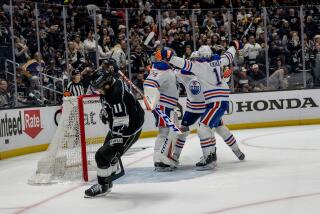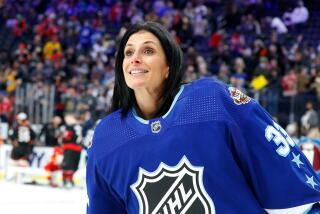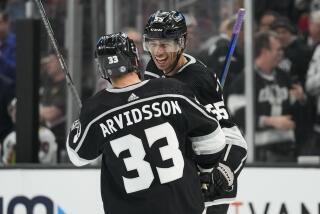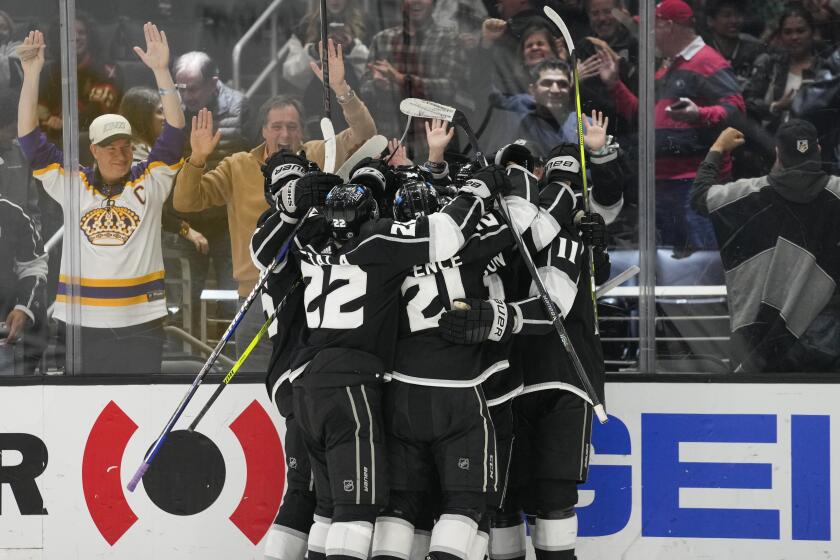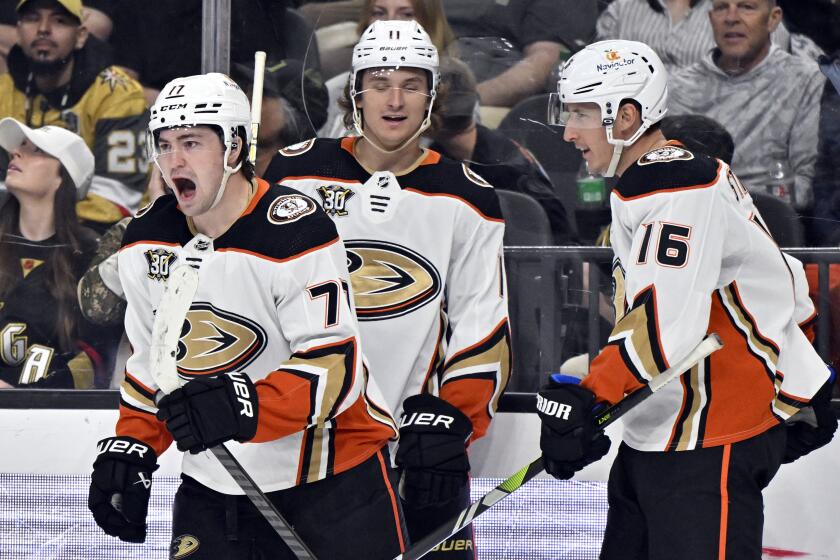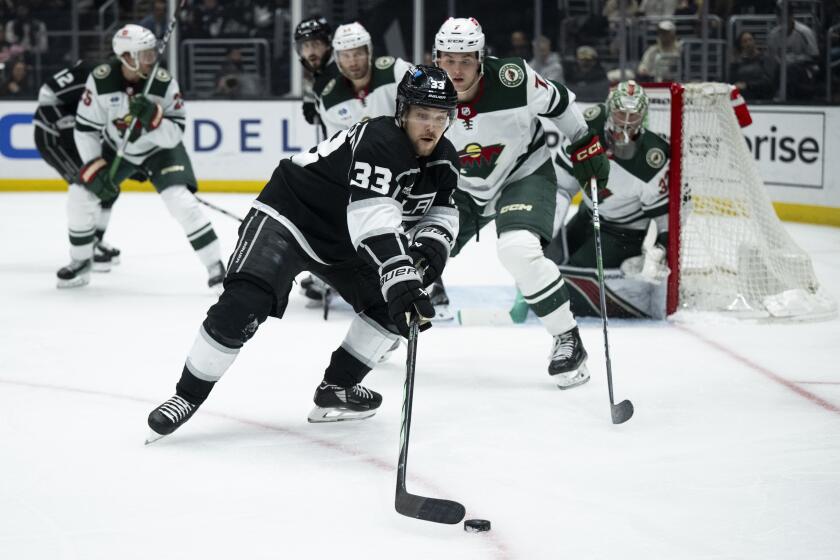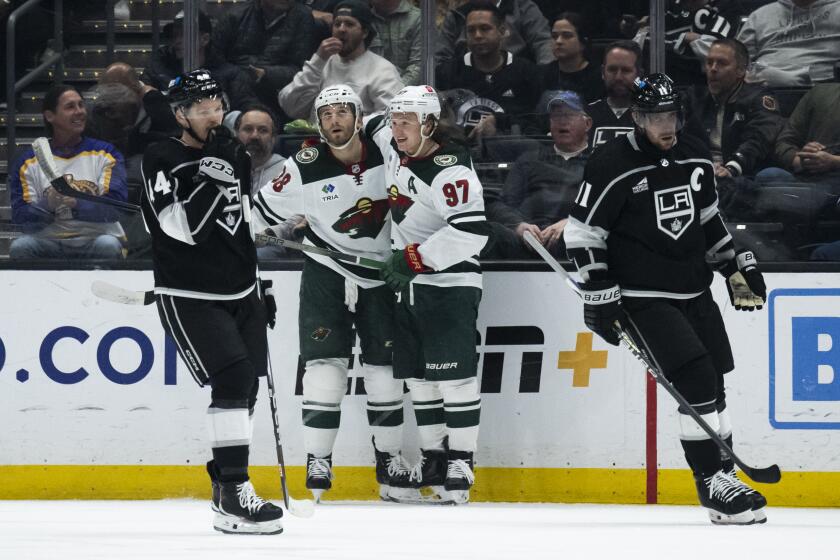Ducks owners Henry and Susan Samueli speak about suspension, team
Ducks owners Henry and Susan Samueli, in their first comments since the NHL lifted its suspension of Henry in November, said they remain committed to the franchise for the long term despite losing “double-digit millions” and seeing the team’s slide since its 2007 Stanley Cup triumph extend to missing the playoffs last season.
“We have so much passion for the team,” Susan Samueli said Thursday. “It just makes us appreciate the Stanley Cup even more, that we had a difficult year last year.”
Henry Samueli was suspended in June 2008 after entering a guilty plea to making false statements to the Securities and Exchange Commission regarding the backdating of stock options at Broadcom, the chip-making company he co-founded. Susan Samueli voluntarily gave up her role with the club to avoid the appearance of impropriety. Michael Schulman, the Ducks’ chief executive officer, ran the team for the Samuelis, who bought the franchise from the Walt Disney Co. in 2005.
A month after NHL Commissioner Gary Bettman reinstated Samueli, a federal judge threw out Samueli’s plea, the only charge against him.
Bettman called it “regrettable and unfortunate that the circumstances at that time caused the Samuelis and the Anaheim Ducks to endure suspension.” However, Henry Samueli said Thursday he understood.
“The situation was pretty surprising the way it all unfolded,” he said. “Gary had to make decisions based on the information he had at the time and things obviously changed dramatically later on and he made the appropriate statement.”
The Samuelis said they’re open to having an NBA team as a tenant at the Honda Center — whose management contract they own — but aren’t looking to buy a team. Nor will they bid for the Dodgers should Frank and Jamie McCourt’s ownership dispute lead to a sale.
“Susan and I are very happy with just the Ducks. Given the losses of the team we certainly aren’t eagerly looking to expand our ownership in sports right now,” he said. “We want to solve the Ducks’ problems first before we would even consider anything else.”
Henry Samueli said the economic downturn has made it impossible to reach his goal of breaking even financially but said he and his wife are not seeking to sell stakes in the team. The Ducks’ season-ticket base, which peaked at 15,000 after their championship, is expected to slightly surpass 10,000 this season. General Manager Bob Murray will have a payroll of $54 million to $55 million, which includes the five-year, $25.5-million contract given to popular winger Bobby Ryan.
“We’re thrilled, because that really completes the puzzle of that core, young group of forwards we’re going to build this team around,” Henry Samueli said. “I think we’re set on the forward side with the signing of Bobby and now we just have to work on strengthening the defense and hopefully bringing up a couple of young great kids like we did with [Cam] Fowler in this past draft. I think we’ll be in a pretty good position down the road.”
That road has been bumpy but Samueli said he’s staying within a budget that makes sense for the Ducks, who are considered part of the Los Angeles market and are ineligible for the NHL’s revenue sharing program.
“We absolutely are committed to putting a competitive team on the ice and we’re giving Bob a budget that is competitive,” Samueli said. “We’ve told him we’re not going to be the top spender in the NHL. I can guarantee that. We are roughly in the middle of the pack in revenue, and we expect our expenses to be roughly in the middle of the pack. That’s what we’ve pretty much told Bob, that we want to kind of match revenue to expenses.
“We’ve given him a budget that’s commensurate with that and he’s doing well sticking to it. The good news about a salary cap system is that it tends to compress the range of salaries across the league so there’s a lot more parity. There isn’t a big difference.”
Samueli said he likes the salary cap concept but — beyond saying the NHL’s economic system “probably needs some tweaking” — declined comment on potential terms for the next collective bargaining agreement, citing league rules against owners publicly discussing those issues.
“We’ve talked to Gary many times about our financial situation so he knows what we’re going through and he’ll have to deal with it in the next negotiation to make sure all teams not only are competitive on the ice but are reasonably competitive in their financial performance as well,” he said. “And he’s got a challenge in front of him to deal with, and we wish him well in the CBA negotiations.”
Henry Samueli also said as proof of the couple’s commitment to the Ducks and hockey here, their personal foundation has made considerable investments in local youth and high school hockey programs as well as in two in-line hockey arenas and two ice facilities.
“Just getting young kids excited about hockey, then they’ll want to skate, they’ll want to start joining junior leagues, they’ll want to play in high school, etc., so we’re trying to expand at all levels,” he said. “That’s good for the sport and it’s good for the Ducks long term. Twenty years from now those youngsters will be season ticket holders, hopefully. Or maybe playing.”
Etem among first roster cuts
Winger Emerson Etem of Long Beach, chosen 29th in the June draft, was returned to his junior team, the Medicine Hat Tigers of the Western Hockey League. Also sent back to their respective junior teams were center Peter Holland, right wing Devante Smith-Pelly and defenseman Scott Valentine.
Assigned to Syracuse of the American Hockey League were center Nick Bonino, left wings Rob Bordson, Nicolas Deschamps, and Brandon McMillan, right wing Kyle Palmieri and defensemen Mat Clark, Joe DiPenta and Mark Mitera.
helene.elliott@latimes.com
twitter.com/helenenothelen
More to Read
Go beyond the scoreboard
Get the latest on L.A.'s teams in the daily Sports Report newsletter.
You may occasionally receive promotional content from the Los Angeles Times.
